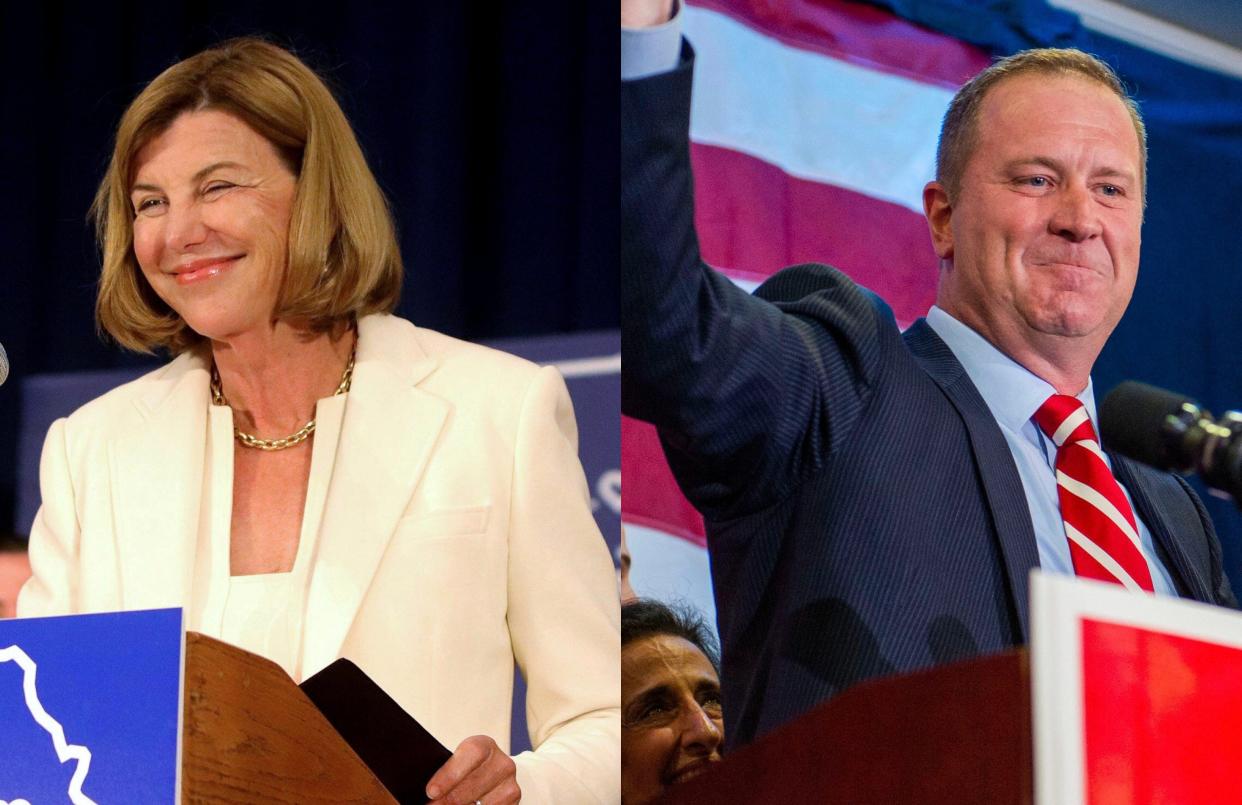Who's running for U.S. Senate in Missouri? What to know about the candidates, issues

At the top of every Missourian's ballot this election are the candidates to be the Show-Me State's next U.S. senator. Here's a rundown of what you need to know about those candidates and the race.
Who are the candidates running for Missouri's U.S. Senate seat?
The Republican nominee is Eric Schmitt, the current attorney general of Missouri and former state senator from St. Louis County.
As the state's top elected lawyer, he's used his office to file multiple lawsuits against the federal government and political opponents, garnering headlines and placing himself in the middle of legal battles involving popular conservative issues and trends. Schmitt sued school districts in an effort to make them drop mask rules and release information about staff trainings on race and equity; he has taken the Biden administration to court over vaccine requirements and student debt relief; and he sued the nation of China in an attempt to hold the nation liable for early COVID-19 infections. He issued a legal opinion minutes after Roe v. Wade was overturned by the U.S. Supreme Court, banning abortion in Missouri.
Election 2022:AG Eric Schmitt wins Republican nomination for U.S. Senate in Missouri
The Democratic candidate is Trudy Busch Valentine, a registered nurse, philanthropist and heiress to the Anheuser-Busch beer dynasty fortune.
A first-time candidate whose family has a long legacy and significant presence in St. Louis, Busch Valentine has pledged tovote for Democratic priorities in Washington. She's put the values of "integrity, honest and respect" front and center in her race, sharing two families tragedies as the primary reason for her running for office. She hasn't shied away from criticizing Schmitt, however, as she focuses on Missouri's abortion ban, lowering costs of living for the middle class and supporting Missouri farmers and agriculture.
Election 2022:Trudy Busch Valentine wins Democratic nomination for U.S. Senate in Missouri
What issues are the candidates prioritizing?
Economy & jobs: Busch Valentine has outlined a plan to "make the American Dream affordable again and rebuild a strong middle class." It prioritizes preventing supply chain crises, increasing support for U.S. farmers and lowering food prices, lowering the cost of prescription drugs, expanding a housing voucher program and creating a federal gas rebate program.
Schmitt has pledged to support cutting taxes, while attempting to tie Busch Valentine to Democratic leadership during a time of economic uncertainty and rising prices.
Abortion: Schmitt activated Missouri's ban on abortion, which does not make exceptions for cases of rape or incest and has a medical emergency exception that has raised concerns among health care providers and attorneys. He has not said where he would stand on a federal abortion ban, which was floated in legislation earlier this year but did not catch on among the broader Republican caucus.
Busch Valentine supports codifying the legal precedent set by Roe v. Wade, now overturned, into federal law, and also supports ending the Senate filibuster to pass such legislation. She has made the issue a hallmark of her campaign, criticizing Schmitt's signing of Missouri's ban and featuring a Joplin woman who struggled to obtain in-state care for her pregnancy in campaign advertisements. Schmitt's campaign allegedly sent cease-and-desist letters to stations airing the ads; they remain on the air.
Voting rights & elections: Busch Valentine has said that "our democracy is under attack," and has expressed support for Democrats' previous proposal to expand protections of voting rights.
Schmitt, as attorney general, backed unsuccessful efforts to overturn the results of the 2020 presidential election in key states, which he touts on his campaign website.
What do I need to know about this race?
This U.S. Senate seat opened up last year after U.S. Sen. Roy Blunt, a Republican who's been in Senate since 2010 and in Congress since 1997, announced he was retiring from public office. That announcement immediately prompted a flurry of activity among prominent Missouri politicians, especially Republicans who saw an opening in a state that has increasingly favored the GOP in statewide races.
Schmitt won a chaotic and crowded Republican primary, consolidating a large base of late support to handily defeat former Gov. Eric Greitens, who faced allegations of domestic abuse and immense Republican backlash, and U.S. Reps. Vicky Hartzler and Billy Long, among other opponents.
Busch Valentine, despite being a late entrant to the Democratic race, defeated her main opponent, Marine veteran Lucas Kunce. She rode to victory on a surge of late advertising spending and a tamped-down message of civility and empathy, drawing a sharp contrast to Kunce's populist and often uncompromising campaign.
The winner between Schmitt and Busch Valentine will join the 100-person U.S. Senate, the higher chamber of Congress where legislative priorities often live or die. A Schmitt victory would retain the seat under Republican control and send the current AG to join the former AG, U.S. Sen. Josh Hawley, to represent Missouri on Capitol Hill. A Busch Valentine victory would flip the seat blue, a significant development in a Senate currently divided 50-50 between parties and with Democrats facing historical midterm opposition as the party in power.
Galen Bacharier covers Missouri politics & government for the News-Leader. Contact him at gbacharier@news-leader.com, (573) 219-7440 or on Twitter @galenbacharier.
This article originally appeared on Springfield News-Leader: Missouri U.S. Senate race: What to know about candidates, issues

